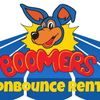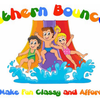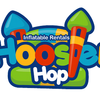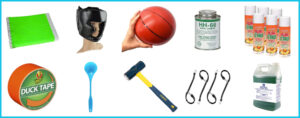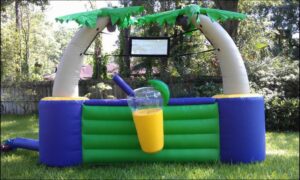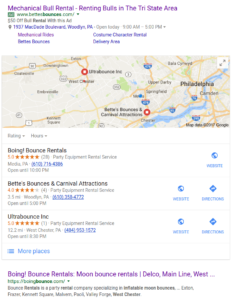I will be writing a series of posts about on-page and off-page party rental SEO (Search Engine Optimization). I do not claim to be a SEO expert, but I know how to look things up on Google and I know how to take what I read and apply it to party rental businesses. SEO is a big topic with a lot of changing parts and can seem very technical and overwhelming. I will try to break it down into small pieces that are easy to understand, actionable, and specific to inflatable rental businesses.
Content is Easy
Over and over I read (and hear) that website content, what is written in the text on the page, is the single most important factor in ranking well in organic searches. My experience shows this to be true as well. And the good news is that on-page content is probably the easiest part of SEO to understand.
Write for Humans, Not Machines
First of all, your content is supposed to be written for humans to read and not for search engines. This means you have to figure out a way to get your keywords and phrases into that content in a natural way. Google knows how to take bits and pieces of on-page content to determine if a site is relevant to the search. For example, if I search for “moon bounce rentals west chester”, here is how Google displays my listing, which is the first page, 2nd down in the organic listings.

Party Rental SEO Diagram
You will notice that Google puts in bold the words from the search. Also notice that the words are located in various sentences in the content of my home page, but Google makes sense of it. So I don’t have to write “moon bounce rentals west chester” as an entire phrase in my website text in order to rank high in the search. If I tried to use that entire phrase, plus a similar phrase for all the other towns I service, my website would be very annoying for humans to read.
NOTE: There are two types of keywords. Meta keywords and keywords found in your on-page content. This article is about the latter. Meta keywords, which are in the HTML background of your site, have been abused so much in the past with keyword stuffing, that they are almost irrelevant today. Most of what I read says to either leave them out, or just use two or three. Meta Keyword stuffing will potentially hurt your website ranking, so don’t do it.
It is important to note the term “keyword” for SEO purposes does not necessarily mean a single word, but also refers to short phrases. For example, the word “bounce” could be considered a keyword, but alone it is too generic to really help you. The keyword (phrase) “bounce house rentals” is going to work much better.
Use Local Terminology
If inflatable bounce houses are called “moon bounces” in your area, then obviously you target “moon bounce rental” and not “bounce house rental”. There is not a single set of keywords that will work best across the U.S. You need to use the phrases that are going to work in your part of the country.
Think Like Your Customer
To figure out the keywords you should be targeting, you need to put yourself in your customer’s shoes and try to think of what would they type in the search engine when they need what you are renting.
When you talk to your customers, ask them how they found you. If by internet search, ask them what they typed in the search bar. Most likely you will find it was with keywords you already are targeting, indicating which of your keywords are working.
It’s the customer not calling you, who typed in something different than what you target, that you are missing. A good practice is to ask people you meet, who fit your typical customer profile, what phrase they would enter to search for your services. Try to be vague when you ask so that you aren’t leading them to the answer by the way you present the question. Also, don’t take one person’s response and make changes to your site. Get a larger sample size before making changes.
Home Page
I would use your Home page to focus on your top few keywords and use other pages, such as individual product pages, About Us, etc, for less important keywords. A Home page introduction to your company, what you do, what types of products you have, etc. gets you a long way in covering keywords in your content. It is a very natural place for your to enter the types of equipment you rent and areas you service.
Service Area
A party rental company is a local business, but not one in a fixed location since we deliver. So what works for a fixed location local business (which a lot of online advice is written for) does not necessarily work for us. If you own an indoor party center, the town you are located in would probably be the only town/location that you need to really target. But as a rental company that delivers to our customer’s location, we can’t just target the town we are based in, we need to target the towns we service. What I have done, and it seems to work, is put my delivery area, by town with the county as the header, towards bottom part of my Home page. Some may think this is keyword stuffing, which is frowned upon by search engines, but my experience is that it has only helped my website rank higher. And when I expanded my delivery area and added new towns to my Home page, I suddenly started getting orders from those areas.
How to Apply Party Rental SEO to Your Rental Business
Read through your website and make sure your keywords are appearing in your on-page content. Make sure you know what keywords and phrases to target. Think like a customer who isn’t overly familiar with renting an inflatable. What would they type in the search bar? Once your site is ranking high for the keywords you are targeting, and you know from the results you are targeting the right keywords, don’t mess with success.
Share this Post
Read More
Looking for a New Software?
60 Days Free
$25/mo For the First Year-
Free SSL Cert for the 1st Year
-
Unlimited Inventory Amount
-
No Credit Card is Necessary
Don't Take Our Word For It!
